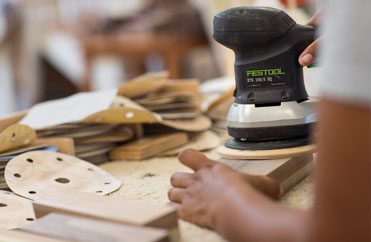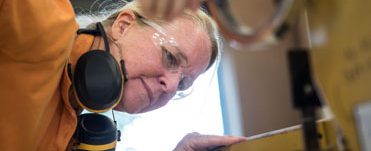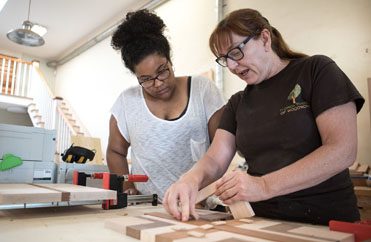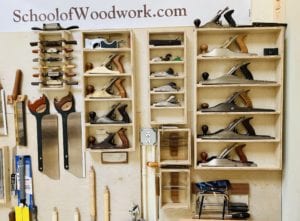Florida School of Woodwork – All of the classes are taught in a remarkable workshop on the edge of downtown Tampa. The workshop is in a completely renovated building from the 1920s that is on the National Historic Register. When we did the renovation, we were careful to keep the character of the building and you’ll find unique and delightful elements of this during your time here. You won’t be working in a windowless, metal building, you’ll be working in a light-filled, comfortable space with character and history. We keep our classes small so there is lots of interaction with the instructor, space for you to work, and the opportunity to enjoy your time. You won’t be lost in a crowd.
The School is incredibly well-equipped with tools from a broad array of manufacturers. For example, we have a 6″ Powermatic jointer, an 8″ Grizzly jointer, and a 14″ Minimax jointer. This not only brings great utility and flexibility to the workshop but also allows the student to experience the performance of these machines at different price points and sizes. Every machine is connected to a dust collection system, and there are air filters cleaning the particulate to keep the workshop healthy and clean.
Each student has a:
Benchcrafted bench,
Curated hand tool kit on the wall next to their bench,
Festool sander and vac system.
Comfy stool with a padded swivel seat and back
There are two main workshops, the back studio is predominately a bench room and a turning studio when needed, and the main studio houses both the equipment and more student work areas. Both studios are equipped with Audio Visual – Large screen TVs, Camera projection, etc. There is also an outside courtyard that we use for a portion of the year. It provides a place to relax, and eat lunches.
The School usually provides lunch on Monday and Friday. Tuesday, Wednesday, and Thursday students can bring a packed lunch or there is a local cafe and also a local grocery store with a deli counter.
The best quality, North American Hardwoods are kept on hand and the majority of classes will include lumber. This means that you don’t have slog boards on a plane or load your car up, and unless milling is part of the learning experience it will be pre milled for you and ready on arrival. We are woodworkers at heart and care deeply about the quality of lumber and milling.
Parking – there is plenty of parking. Free on the street – which is where most students park and paid ($7 a day) directly across from the School.
Beginning Woodworking Classes
If you are new to woodworking then there are various foundational skills you need to focus on first. These include topics such as design, power tool use, basic joinery, understanding wood, etc. All of these topics and skills are covered in our Beginning Woodwork classes. The Beginning or Foundation classes are organized to establish a strong skill set and get you woodworking competently, safely and with a growing enthusiasm.
Step 1 – Beginning Woodworking
This class lays down all of the knowledge you will need to either continue working in your own workshop or as a foundation for all the classes moving forward. We have also had highly experienced woodworkers take this class who have said that they wish they had taken it years ago.
There are two class lengths you can choose from:
- A weekend intro (fast paced, no projects)
- A week long Beginning Woodworking
If you take the weekend class, your next class will be a table making class. The weekend class is designed more for those who want to figure out if they are interested in woodwork, or as a refresher for those who have been away from it for a while.
If you take the 5-day long Beginning Woodworking class, the next classes we recommend are:
- Box Making
- Handtool and Joinery
- Router Weekend
- Finishing Weekend
- Intro to Case Work
Step 2 – Project Classes
Once you have some basic knowledge under your belt, the next step is to start designing and building projects. The best projects are those that stretch your abilities and challenge you, but don’t make you scream out of frustration or panic. We have found that projects centered around building small tables, boxes and smaller bookcases are the best building blocks at this stage. Each of these projects/classes will expand your knowledge in all areas of woodworking – design, milling, joinery, construction and finishing, as well as familiarize you with different kinds of woods and additional tools.
Note – If you only took the 2-Day long Beginning Woodworking Weekend Class, we recommend that you start with a table making class, otherwise the three classes (Table Making, Box Making, Bookcase Making) can be taken in any order
Step 3
Intermediate Woodworking Classes
Once you have established a solid foundation of woodworking knowledge, you can start designing and building pieces a little bit more independently, however there are still skills that you need to acquire that will help evolve your furniture work. The majority of the intermediate classes are center around projects and each have their own focus. The classes can be taken in any order at this point:
- Drafting & CAD for Furniture Makers
- Cabinet Making
- Nightstands
- Wall cabinets
- Side Tables
- Basic Chairs
- Table making
- Advanced joinery
Usually, these classes run 5 – 14 days.
Step 4
Advanced Woodworking Classes
At this stage in a student’s development, they are expected to be creating portfolio quality pieces.
- Advance Design skills
- Making Curves and Angled Work & Advanced joinery
- Veneering
- Advance Class – Designing & building
- Multi-drawered cabinet Making
- Headboard Making
- Curved writing desk Making
- Chair Making





